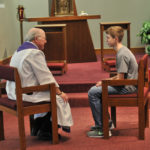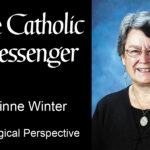
Bishop Thomas Zinkula holds the chalice above the altar as he prepares the gift of wine for the Eucharist.
By Barb Arland-Fye
The Catholic Messenger
Bishop Thomas Zinkula identifies five reasons for the U.S. bishops’ overwhelming support of a document on the Eucharist, “The Mystery of the Eucharist in the Life of the Church.” Proposed shortly after the 2020 election of a Catholic president who is pro-choice, the drafting of a document swirled in controversy for months leading up to the final document and vote.
Approved Nov. 17 on a 222-8 vote during the bishops’ fall meeting in Baltimore, the document provides the catechetical piece for their Eucharistic renewal project, which culminates with a National Eucharistic Congress in 2024 in Indianapolis. Bishop Zinkula attributes these reasons to approval of the document:
• Regional meetings. “We had the opportunity to be heard verbally at regional meetings. We also had the opportunity to offer written amendments after we received the first draft of the document after the regional meetings. I appreciate (Diocesan Director of Liturgy) Deacon Frank Agnoli’s careful review of the USCCB draft documents related to liturgy and worship. I am grateful for his well-considered and well-written suggestions for amendments.”
• In-person attendance for the fall meeting, during which the bishops approved the document. The fall 2020 and spring 2021 meetings were held virtually because of the pandemic. “The dynamics are very different in person.”
• Prayer. “We prayed before the Blessed Sacrament the first morning of the meeting, during which we listened to a homily by one of the bishops. In addition, we availed ourselves of the sacrament of penance. That probably made a big difference.”
• Executive session at the start of the meeting. Executive or closed sessions usually take place later in the meeting, Bishop Zinkula said. Starting with an executive session provided an opportunity for more discussion and consensus building.
• Synodality. “This was an exercise in synodality (the involvement and participation of everyone in the life and mission of the Church).”
The document emphasizes “Christ’s gift of himself in the Eucharist and our response to that gift” (P. 5, no. 7). The bishops avoided injecting politics into the document, which includes a section on conscience but does not call out Catholic politicians who publicly support policies and laws that contradict Church teaching, Bishop Zinkula said. “It would have become more political if we would have named names. The document is very clear that each bishop should deal with a Catholic in his own diocese who publicly opposes Church teaching.”
The document states, “Lay people who exercise some form of public authority have a special responsibility to form their consciences in accord with the Church’s faith and the moral law, and to serve the human family by upholding human life and dignity” (P. 19, no. 36)…. “The Code of Canon Law refers to this situation of a manifest lack of proper moral disposition when it states that those who ‘obstinately persist in manifest grave sin’ are not to be admitted to Eucharistic communion” (P. 25, no. 49).
“… It is the special responsibility of the diocesan bishop to work to remedy situations that involve public actions at variance with the visible communion of the Church and the moral law. Indeed, he must guard the integrity of the sacrament, the visible communion of the Church, and the salvation of souls.”
Bishop Zinkula thinks most Catholics probably won’t read the document. As a result, “I don’t expect the document in and of itself to have much impact on Catholics in the pew or those who no longer practice the faith. But the way it is used by Church leaders hopefully will, including in connection with the Eucharistic revival project. The document will be the catechetical foundation for the revival. But it also will have a great impact if we all internalize its teaching. Better understanding the Eucharist and thereby fully, actively and consciously celebrating the Mass will touch the hearts of people.”
The bishop said he “appreciates the fact that the document talks about the Eucharist being the sacrament of love. The Eucharist is at the very heart of our faith. God’s love is revealed in Christ and seen most vividly in the crucifixion, in Jesus’ self-giving love. There are social implications of the Eucharist. It should relate to how we live our lives. We are called to strive to imitate and share Christ’s self-giving love in our own lives. That is what it means to be a missionary disciple.”
You can read “The Mystery of the Eucharist in the Life of the Church” on the U.S. Conference of Catholic Bishops’ website (https://tinyurl.com/pewcha8v).











